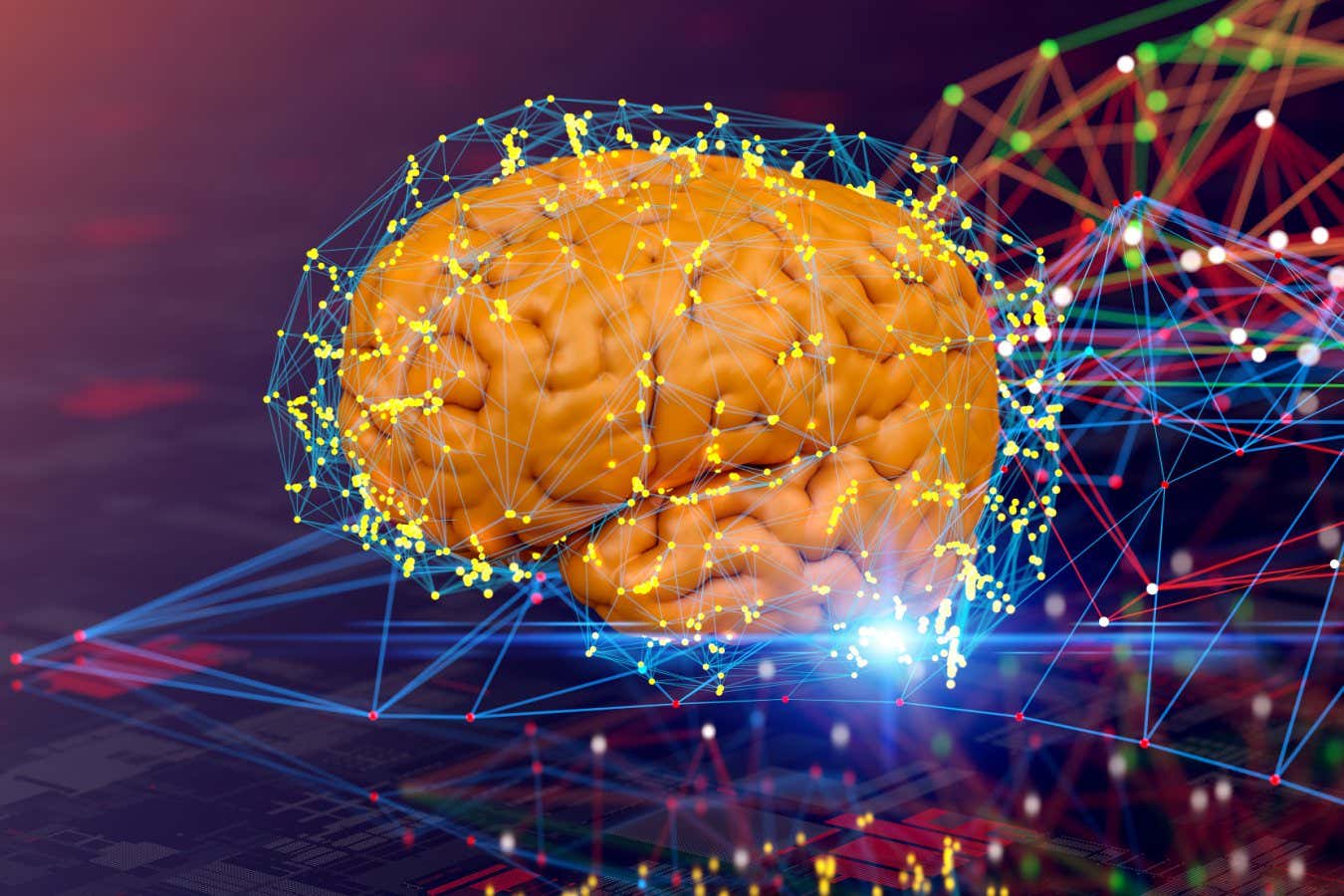Mind-reading AI can translate brainwaves into written text: Using only a sensor-filled helmet combined with artificial intelligence, a team of scientists has announced they can turn a person’s thou…::A system that records the brain’s electrical activity through the scalp can turn thoughts into words with help from a large language model – but the results are far from perfect
Big Autocomplete isn’t “AI”. This is not new technology, this is “We used buzzwords to hype up 20 year old EEG interpreters, please give us money”
Calling llm “big auto-complete” is like calling people “big bacteria” . It’s true that they act on the same goal, guess the next word for llm and auto-complete; survive and reproduce for people and bacteria, but they are vastly different in scale and complexity.
Also what would AI be to you if not an llm? Cause I’d say anything that has an SAT score higher than most Americans has some form of intelligence.
“Big Bacteria” is a much more accurate descriptor of humans than “Artificial Intelligence” is of large language models.
This is the same problem we had with IQ testing, what the test measures is not “intelligence”, but the ability to retain and process information according to a predefined schema. This requires no intelligence at all, as demonstrated by the fact that a sufficiently large statistical model of human writing patterns can pass the SATs.
I’ve always wondered with stances like this, why do you assume that our “intelligence” is much different than that of llms? I mean, as much as we like to feel superior, is there anything that would really prove that our brains don’t work in a similar manner behind the curtains? What if we just get input stimuli and our mind is simply the process of figuring out the most likely answers, reactions or whatever, to that?
I haven’t seen anything to that effect, but then again my field of study is vastly different. I’d like to be enlightened certainly!
LLMs are statistical models of human writing, they only offer the appearance of intelligence in the same fashion as the Chinese Room thought experiment.
There’s nothing “intelligent” in there, just a very large set of instructions for transforming inputs into outputs.
A sufficiently advanced model of the human brain can be “intelligent” in the same way that humans are, but this would not be “artificial” since it would necessarily employ the same “natural” processes as our brains.
Until we have a model of “intelligence” itself, anyone claiming to have “AI” is just trying to sell you something.
What I wonder, though, is if it isn’t possible to describe human brain, and the nervous system as a whole, as a very large set of instructions for transforming inputs into outputs?
It could be described that way, but it wouldn’t be a very apt metaphor. We aren’t simple, stateful input-to-output algorithms, but a confluence of innate tendencies, learned experiences, acquired habits, unconscious motivations, and capable of modifying our own thought processes and behavior on the fly to suit whatever best fits the local context. Our brains encode a model of the world we live in that includes models of ourselves and the other people we interact with, all built in realtime from our observations without conscious effort.
I’m not disputing that our intelligence isn’t more sophisticated, but rather that maybe the “intelligence” in llms is not necessarily all that different from ours, just based on different and limited inputs, and trained on a vastly less wide data.
This seems like circular reasoning. SAT scores don’t measure intelligence because llm can pass it which isn’t intelligent.
Why isn’t the llm intelligent?
Because it can only pass tests that don’t measure intelligence.
You still haven’t answered what intelligence is or what an a.i. would be. Without a definition you just fall into the trap of “A.I. is whatever computers cant do” which has been going on for a while:
Computers can do arithmetic but they can’t do calculus, that requires true intelligence.
Ok computers can do calculus, but they can’t beat someone in chess, that requires true intelligence.
Ok computers can beat us in chess, but they can’t form coherent sentences and ideas, that requires true intelligence.
Ok computers can form coherent sentences but …
It’s all just moving the goal post to try and preserve some exclusively human/organic claim to intelligence.
There is one goalpost that has stayed steady, the turing test, which llm seems to have passed, at least for shorter conversation.
This seems like circular reasoning. SAT scores don’t measure intelligence because llm can pass it which isn’t intelligent.
The purpose of the SAT isn’t to measure intelligence, it is to rank students on their ability to answer test questions.
A copy of the answer key could get a perfect score, do you think that means it’s “intelligence” is equivalent to a person with perfect SATs?
Why isn’t the llm intelligent?
For the same reason that the SAT answer key or an instruction manual isn’t, the ability to answer questions is not the foundation of intelligence, nor is it exclusive to intelligent entities.
You still haven’t answered what intelligence is or what an a.i. would be.
Computer scientists, neurologists, and philosophers can’t answer that either, or else we’d already have the algorithms we’d need to build human-equivalent AI.
Without a definition you just fall into the trap of “A.I. is whatever computers cant do” which has been going on for a while:
Exactly, you’re just falling into the Turing Trap instead. Just because a company can convince you that it’s program is intelligent doesn’t mean it is, or else chatbots from 10 years ago would qualify.
There is one goalpost that has stayed steady, the turing test, which llm seems to have passed, at least for shorter conversation.
The Turing Test is just a slightly modified version of a Victorian-era social deduction game. It doesn’t measure intelligence, but the ability to mimic a human conversation. Turing himself acknowledged this: https://www.smithsonianmag.com/innovation/turing-test-measures-something-but-not-intelligence-180951702/
computer scientists, neurologists, and philosophers can’t answer that either, or else we’d already have the algorithms we’d need to build human equivalent A.I.
I think your mixing up sentience / consciousness with intelligence. What is consciousness doesn’t have a good answer right now and like you said philosophers, computer scientists and neurologist can’t come to a clear answer but most think llms aren’t conscious.
Intelligence on the other hand does have more concrete definitions that at least computer scientists use that usually revolve around the ability to solve diverse problems and answer questions outside of the entities original training set / database. Yes doing an SAT test with the answer key isn’t intelligent because that’s in your “database” and is just a matter of copying over the answers. LLMs don’t do this though, it doesn’t do a lookup of past SAT questions it’s seen and answer it, it uses some process of “reasoning” to do it. If you gave an LLM an SAT question that was not in it’s original training set it would probably still answer it correctly.
That isn’t to say that LLMs are the be all and end all of intelligence, there are different types of intelligence corresponding to the set of problems that intelligence is solving. A plant identification A.I. is intelligent for being able to identify various plants in different scenarios but it completely lacks any emotional, conversational intelligence, etc. The same can be said of a botanist who also may be able to identify plants but may lack some artistic intelligence to depict them. Intelligence comes in many forms.
Different tests can measure different forms of intelligence. The SAT measures a couple like reasoning, rhetoric, scientific etc. The turing test measures conversational intelligence , and the article you showed doesn’t seem to show a quote from him saying that it doesn’t measure intelligence, but turing would probably agree it doesn’t measure some sort of general intelligence, just one facet.
LLMs don’t do this though, it doesn’t do a lookup of past SAT questions it’s seen and answer it, it uses some process of “reasoning” to do it.
The “reasoning” in LLM is literally statistical probability of which word would follow which word. It has no real concept of what it talks about beyond the pre-built relationship matrices between words and language rules. That’s why LLMs confidently hallucinate obvious bullshit time to time - to them there’s no meaning to either truthful or absolute bonkers text, it’s just words that should probably follow each other.
All inference is just statistical probability. Every answer you give outside of your direct experience is just you infering what might be the answer. Even things we hold as verifiable truth that we haven’t experienced is just a guess that the person who told it to us isn’t lying or has some sort of proof to there statement.
Take some piece of knowledge like “Biden won the 2020 election” me and you would probably agree this is the truth, but we can’t possibly “know” it’s the truth or connect it to some verifiable experience, we never counted every ballot or were at every polling station. We “know” it’s the truth because more people, and more respectable people, told us it was and our brain makes a statistical guess that their answer is right based on their weight. Just like an LLM other people will hallucinate or bullshit and come on the other side of that guess and assert the opposite and even make up stuff to go along with that story.
This in essence is what reasoning is, you weigh the possibilities of either side being correct, and pick the one that has more weight. That’s why science, an epistemological application of reason, is so heavily reliant on statistics…
Yes doing an SAT test with the answer key isn’t intelligent because that’s in your “database” and is just a matter of copying over the answers. LLMs don’t do this though, it doesn’t do a lookup of past SAT questions it’s seen and answer it, it uses some process of “reasoning” to do it.
You’ve now reduced the “process of reasoning” to hitting the autocomplete button until your keyboard spits out an answer from a database of prior conversations. It might be cleverly designed, but generative models are no more intelligent than an answer key or a library’s card catalog. Any “intelligence” they appear to encode actually comes from the people who did the work to assemble the training database.
This is not how LLMs work, they are not a database nor do they have access to one. They are a trained neural net with a set of weights on matrices that we don’t fully understand. We do know that it can’t possibly have all the information from its training set since the training sets (measured in tb or pb) are orders of magnitude bigger than the models (measured in gb). The llm itself is just what it learned from reading all the training data, just like how you don’t memorize every passage in a book you read, just core concepts, relationships and lessons. So if I ask you " who was gatsbys love interest?" You don’t remember the line and page of the text that says he loves Daisy, your brain just has a strong connection of neurons between Gatsby, Daisy , love, longing etc. that produces the response “Daisy”. The same is true in an LLM, it doesn’t have the whole of the great Gatsby in its model but it too would have a strong connection somewhere between Gatsby, Daisy, love etc. to answer the question.
What your thinking of are older chatbots like Siri or Google assistant which do have a set of preset responses mixed in with some information from a structured database.
Id much rather have a hoodie that i can use to connect and interface with devices then an always online chip implement. I am rooting for this one.

Let me guess: not covered by the Fifth Amendment in the US. Its not your words or thoughts, its your brainwaves. No different than testing your BAC against your will
It’s a pretty clear violation of the 4th amendment. Won’t stop companies from building this tech into their wireless headphones, though.
How’s that working for defendants’ these days?
Wasn’t there a big case in Pennsylvania invalidating this in some sneaky way or something?Something something Foregone conclusion doctrineNothing comes up when you search Pennsylvania + foregone conclusion. Unless you mean police making you give up passwords, which was deemed illegal by higher courts.
No but aren’t there many exceptions to 4th and variably so? Its seems like its not so clear cut these days
No, 4th amendment is pretty cut and dried.
With the exception of Terry Stops.
- immigration
- random checkpoints
- alcohol checkpoints
- ?
Or maybe build it into some neat cowboy hats?
This is clearly a derivative of the work done by Doctor Emmett Brown in the mid 1950s.

Ahh yes, thought crime time.
I just made a comment saying people can’t read my mind and now this
deleted by creator
Thank you, can’t remember the last time I got out of bed laughing my ass off
I feel it’s extremely important to note that I almost instantly died after reading this comment
Only a sensor-filled helmet? Amazing. So much better then the previous model which required removing the brain the cutting it into thin slices.






